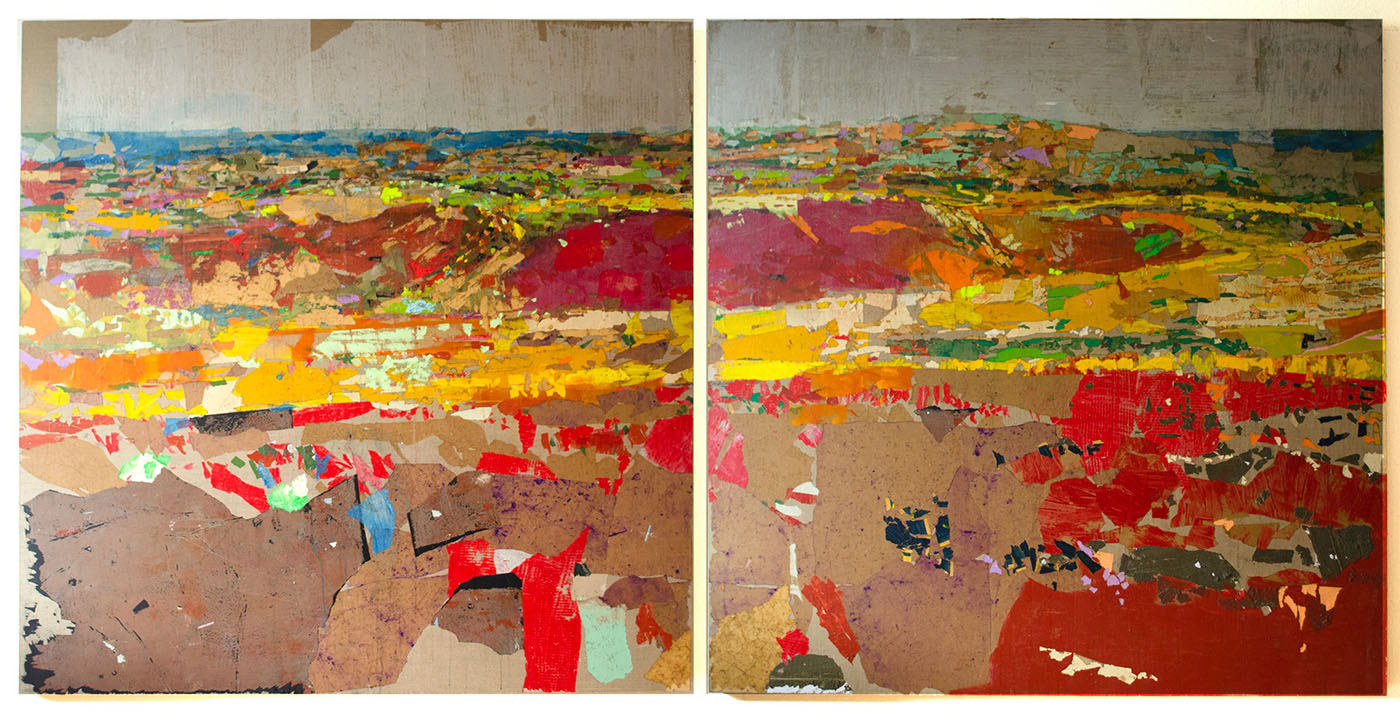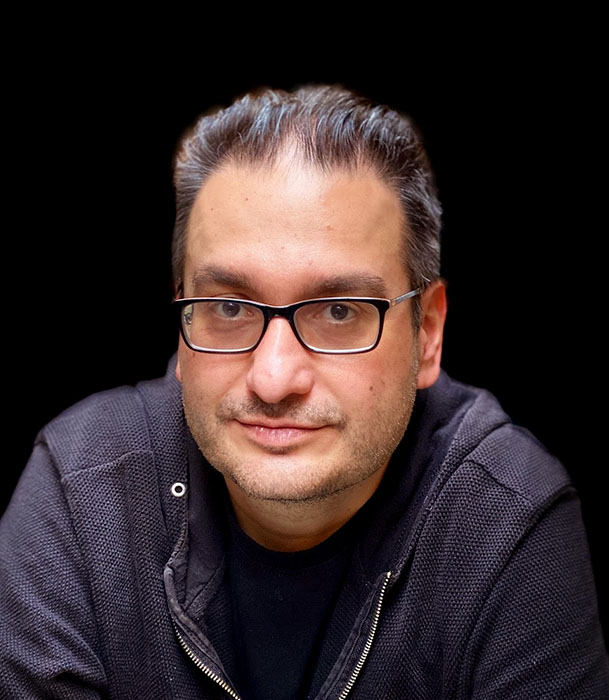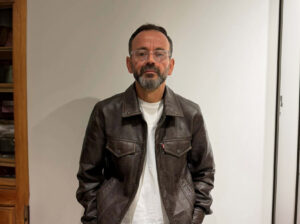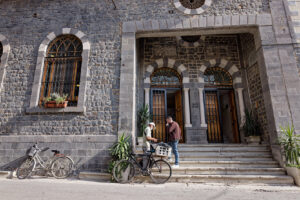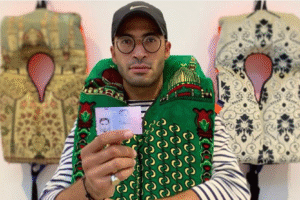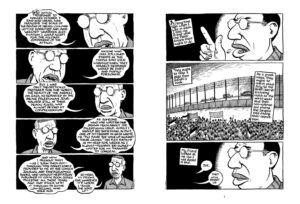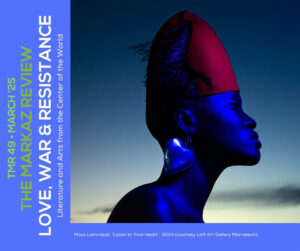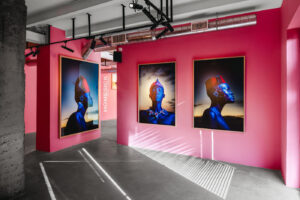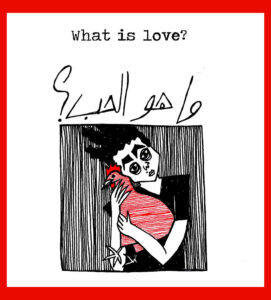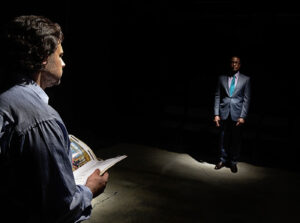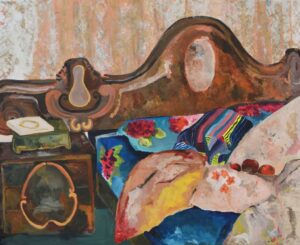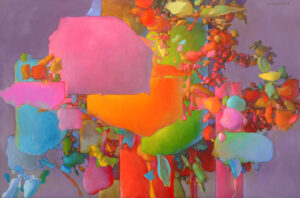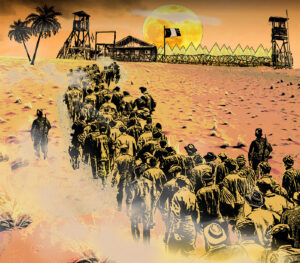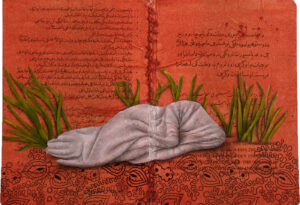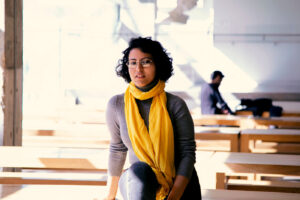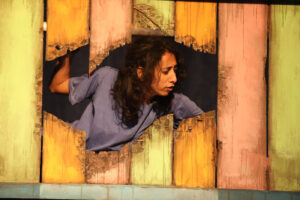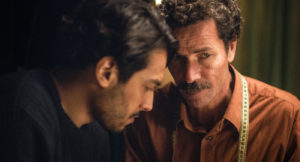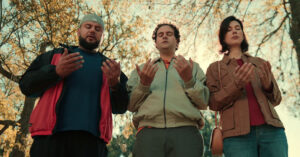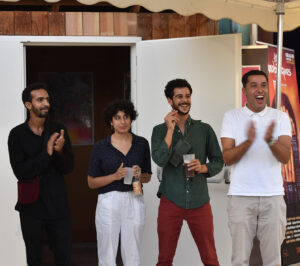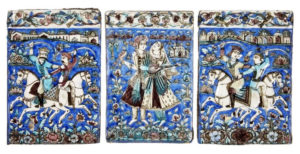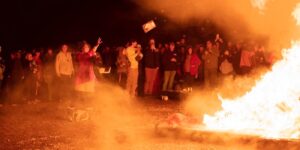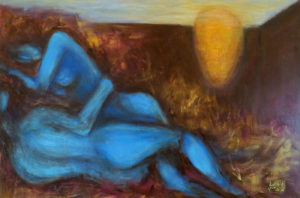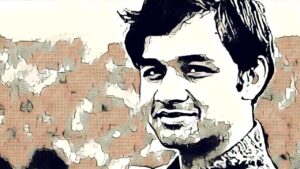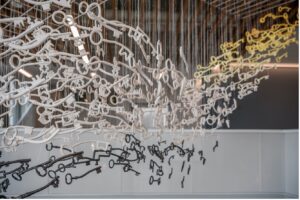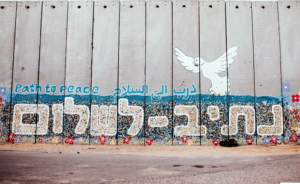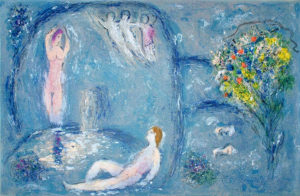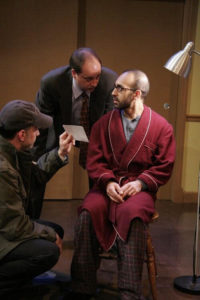Can a crush on a teacher survive marriage, revolution, and a sinking, refugee dingy on the Mediterranean Sea?
Hassan Abdulrazak
Reem is in her early 40s, dressed in simple clothes.
Oh my God he is so gorgeous. So so gorgeous. He has curly hair, a chiseled chin and a thin beard. Not terrorist beard, not hipster beard but professor beard, young professor beard. And the kindest of smiles. Jamal, that’s his name. Professor Jamal. Even his name means beautiful.
He taught me English, at the university, before the war and I was so, so … It’s a cliché I know. To fall in love with your teacher, it’s a cliché but then clichés happen, right? Let me tell you the story of how I fell in love with him.
The Israelis were bombing the Palestinians. I know — not the best start for a love story. Anyway, we were watching this on TV, the bombing. In those days we Syrians had the luxury of watching wars on TV, never imagining for a second that these sorts of catastrophes could happen here.
As usual everyone was fired up, being pro-Palestinian. Outside restaurants, the owners would lay down Israeli flags for passersby to step on. Everyone was properly angry as you would expect. But Professor Jamal told us a story — to be honest a dangerous story because it could have been misconstrued as being sympathetic to the enemy — he told us about Jews who tried to flee Nazi Germany during the Second World War. Things were already very bad for them at home. So they got on a ship that sailed to Cuba. They were hoping to get from there to America. And that ship sailed halfway around the world but it wasn’t allowed to dock in Cuba. It then sailed to Florida hoping for a better result, but once again they were turned away. No one wanted the Jewish refugees. The captain had no choice but to sail back to Europe. Many of those onboard ended up being murdered in the Holocaust.
Why did Professor Jamal tell us this story? I guess he wanted us to see another side to the Palestinian-Israeli conflict. That the Jewish narrative, the reason why the Jews ended up in Palestine, was not trivial. It was really the first time I saw the Jews as victims rather than aggressors. The story messed with my head and I kept thinking about it over and over. And that also meant that I couldn’t get gorgeous Jamal, the teacher who dared to be different, out of my head either.
One night I dreamt that I was in Jamal’s house and he was teaching me a sonnet. “Let me not to the marriage of true minds admit impediments.” I’d like to think it was that one but I’m probably embellishing. It was a dream after all.
We were sitting on these uncomfortable wooden chairs. And he could see that my back was hurting so he said let’s move to the sofa. And now we were on the sofa together with Shakespeare’s book between us and then the dream just kind of — you know — changed, the way dreams do. And we were no longer on the sofa but in Jamal’s bed! And I remember thinking any minute now he was going to lean over and kiss me. And my heart was just beating and beating and then the bedroom door opens and in walks Jamal’s wife. Oh yeah he is married, I forgot to mention that. Oh and so was I. So yeah, his wife walks in on us but get this, she was not mad. In fact, she was bringing us tea and baklava on a silver tray. What a dream, eh? Analyze that, Sigmund!
My marriage was arranged. It happened two months before I met Professor Jamal. I first got engaged to my future husband and that meant we were allowed to go out together to see if we liked each other before taking the big plunge. My husband doesn’t have a chiseled chin like Jamal. Poor love, he’s a bit on the chubby side. In the facial hair department, he favors a moustache rather than a beard. We spent many afternoons walking side by side in the park. I liked my future husband even though he never so much as held my hand, not because he was shy but because he was a little bit old fashioned that way and didn’t think it was proper. But still I liked him enough that I said yes to the marriage. My mother and father were so happy, you’d think it was them getting married. I really thought I was in love with my husband until I met Professor Jamal. Then I knew what real love was. Butterflies in the stomach, and constant dreams about us being together, often in bed, sometimes alone, sometimes with his wife, sometimes with my husband. Sometimes with both his wife and my husband who would watch us kiss — tongues and all — while they nibbled on baklava and sipped their tea.
When I made love to my husband, when I closed my eyes, I pictured Jamal. I felt ever so guilty afterwards and worried that my children would come out looking like Professor Jamal. And my husband would say: “Reem, come here Reem, stop hiding in the bathroom, come here and explain why these bastard children look nothing like me.”
Fast forward to the start of the revolution. We heard stories from friends and neighbors about this march or that demonstration, but we never took part. No one was shouting for regime change at the beginning but when the government started shooting at the demonstrators that’s when things escalated.
We started to hear gunfire in the streets. That went very quickly from being surreal, like something you’d see on TV in a movie to being regular and normal and part of everyday life. That’s how war happens; it creeps up on you, day by day.
I’m alone in the house, preparing lunch in the kitchen when suddenly I see a boy jump over the garden wall and run into my home. “Hide me! Hide me!” he pleads. Soldiers kick down the front door. I think this is it, they will shoot me and I will die just like that, with a half carved eggplant in my hand and without having said goodbye to Professor Jamal. The boy starts screaming, “She’s my sister. She’ll tell you, I wasn’t out on the demonstration! She’ll tell you.” One of the soldiers then turns to me and asks: “Is he your brother?” I’m shaking like a leaf. He shouts again. “Is he your brother?” The boy is pleading with me with his eyes but all I can do is ever so slightly shake my head. “No.” They grab hold of him and drag him kicking and screaming out of the house. The eggplant drops from my hand and explodes like a bomb. I sob uncontrollably. My husband comes back. I’m too ashamed to tell him what happened. I’d like to think the soldiers let the boy go but I know that’s a fiction. They killed him. They killed him and it’s my fault.
It gets very dangerous in our neighborhood, so we move to my aunt’s house. Me, my mother, my husband, our two children, Rania, she’s eight and Younis, he’s a year and a half.
My auntie’s neighborhood is safe at first but that doesn’t last. One time my mother and my aunt are shopping in the market when the shelling starts. It’s so intense. I’m convinced they are going to get killed. I see through the window a cab pull up about 100 meters from the house. Mum and auntie get out and they start jumping around like Mexican beans trying to avoid the shelling until they reach the front door. I hug mum so hard but I can’t get the image of her jumping ridiculously out of my head so I start laughing and soon we are all laughing. My daughter Rania pretends to be a journalist interviewing mum and auntie.
“So how did you feel when the bullets whizzed past you?”
Mum says in an exaggerated voice, “We were very scared!”
Rania says, “Despite your fear, you were charming, very charming” And that just makes us all burst into laughter again. The laughter of the half insane.
It’s clear now we must flee the country. There is no other choice. I say goodbye to mum with a lump in my throat. I don’t know when I will see her again, if ever, but there is no way she can endure the journey we are about to take, not with her heart.
We pack as much as we can carry. My husband pays a smuggler and in the dead of night we get on a truck with other families heading to the Turkish border. Halfway, the truck stops and we are told to get off and walk. The smuggler doesn’t give us an explanation. So here we are walking with our belongings on our backs and heads. This reminds me of pictures I have seen of the fleeing Palestinians when they were driven out of their homes in 1948. I think of Professor Jamal. Where is he now? Has he fled with his family? Is he heading for the Turkish border also or is he going to try his luck in Jordan or Lebanon? We thought about going to Jordan or Lebanon, but we heard that conditions were getting worse and worse for refugees there. My husband has a brother in London. That’s where we want to get to. Somewhere where we can be sure that we would be safe. None of our neighboring countries are stable. In London, this nightmare will end. I do hope Jamal is heading to Europe also.
We walk for a day and a night. At one point we muffle the cries and moans of our hungry children as we walk some 200 meters past an army barracks. If the Syrian government soldiers hear us, they will shoot everyone. My hand is over the mouth of baby Younis and I’m pressing so hard I nearly suffocate him. An old woman who reminds me of mum collapses and my husband drops some of our food rations so he can carry her. I realize how much weight he has lost. Now he too has a chiseled chin like Professor Jamal. I look at him with pity. Sometimes you can mistake pity for love.
We reach a small village, and this amazing thing happens. The villagers come out of their houses and give us water. There is still some goodness left in the world.
Our smuggler is arguing with other smugglers. He leaves them and comes towards us:
“You need to pay $3,000 for the next leg of the journey.”
I’m shocked.
“But we already paid you. What is this? Have you no shame?”
My husband pulls me back before I scratch the smuggler’s eyes out with my nails.
“Sir, help us. We’re desperate,” my husband pleads pathetically.
I know that showing weakness is the wrong strategy. If Professor Jamal was here, he’d grab the smuggler by the neck and teach him a lesson or two. Then I think no, Jamal wouldn’t use violence. He’d use his cunning. He’d come up with some way to psychologically get under the skin of the smuggler. He wouldn’t roll over like my husband. I watch my husband hand over the money, and I am filled with disgust.
The truck we get on is very rickety. It breaks down and we have to get out and push it. My daughter Rania starts shouting at the smuggler.
“Why did you do this to us?”
“Shut up” the smuggler shouts back at her. “I’m going to fire my gun and the soldiers will come and kill you and all your family.”
Surely now is the time for my husband to step up and do something, put this horrid man in his place.
My husband turns to Rania “Be quiet.”
Rania’s hatred of her father is only matched by my own.
For the first time in my life, I wish I were a man. With big muscles and fists like hammers.
Just as I’m about to lose my shit completely and slap the smuggler, I hear Jamal’s voice in my head. “It is a beauteous evening, calm and free.” The words are familiar, another poem he taught me. Wordsworth, I think. I look around me and see the leaves on the trees shaking gently in the warm breeze. Someone, somewhere is experiencing happiness. I have to hold onto that, even if that someone is not me.
It takes many days, several truck changes but finally we reach the border. We sleep in the open with hundreds of other families. Rania whispers in the darkness, “Mum, I’m hungry.” It takes all my strength not to break down in front of her.
My husband is clinging even more to the dream of us making it to London. He says I could get a good job because I speak the language and he can work in his brother’s restaurant. I keep having daydreams about London. I’m visiting Notting Hill like in that movie with Julia Roberts and I get into the bookshop but instead of seeing Hugh Grant, I see Professor Jamal, smiling that incredible smile of his and brushing his curly hair with one hand while holding onto a pile of books with the other.
My husband has gone to search for a smuggler. I take advantage of his absence and go to a kiosk to buy credit for my phone. I’m desperate to check Jamal’s Facebook status. The man at the kiosk says: “Twenty dollars.”
“Twenty dollars! Are you joking? I can feed my kids for a week on twenty dollars.”
“Take it or leave it.” He says and turns to another customer.
I walk away. Of course I’m not going to buy the credit. That’s madness.
But then I run back to the man. “Here, take your bloody twenty dollars.”
Immediately I have the remorse of an addict. I log into Facebook. I go to Jamal’s page. My heart is thumping in my chest. He hasn’t posted a thing in well over a month. Oh God, please let him not be dead. Please, please, let him not be dead.
Our new smuggler gets us to the shore. We are about to board a boat to Greece he says. In my head I picture a ship like the one the Jewish refugees got on when they went to Cuba. The smuggler brings out a rubber dingy. What the hell? There are at least fifty of us waiting to get onboard. How are we supposed to fit in?
We are packed in like sardines. I’m holding onto Rania with one hand and Younis with the other. And soon as we are in the middle of the Mediterranean, the weather turns nasty and the waves pound our dingy. I’m panicking. I want to go back to the shore but it’s too late, we are too far out. I’m so worried about the children. Rania can’t swim and Younis is a toddler. I’m certain we are all going to drown. I try to remember a poem, an English poem professor Jamal had taught me. Something about drowning, about waving and drowning but I can’t remember the words.
The waves are getting higher and higher.
The boat is filled with screams and vomit and water.
We’re going to capsize! Rania! Younis!
I then hear a voice in my head. The voice is deep and strong. It tells me: “Inna Lillahi Wa Inna Ilayhi Rajioon” — we belong to Allah and to Him we shall return.
Is this the voice of Allah or is it the voice of Jamal? I can no longer tell. I once read that the Sufis believe if you fall madly in love, you reach God. I never understood that idea till now.
Inna Lillahi Wa Inna Ilayhi Rajioon
The water is rising and rising.
Inna Lillahi Wa Inna Ilayhi Rajioon
I’m so cold I can’t feel my children’s hands.
Inna Lillahi Wa Inna Ilayhi Rajioon
Please Allah make our deaths quick and painless.
Inna Lillahi Wa Inna Ilayhi Rajioon
Inna Lillahi Wa Inna Ilayhi Rajioon
Inna Lillahi Wa Inna Ilayhi Rajioon
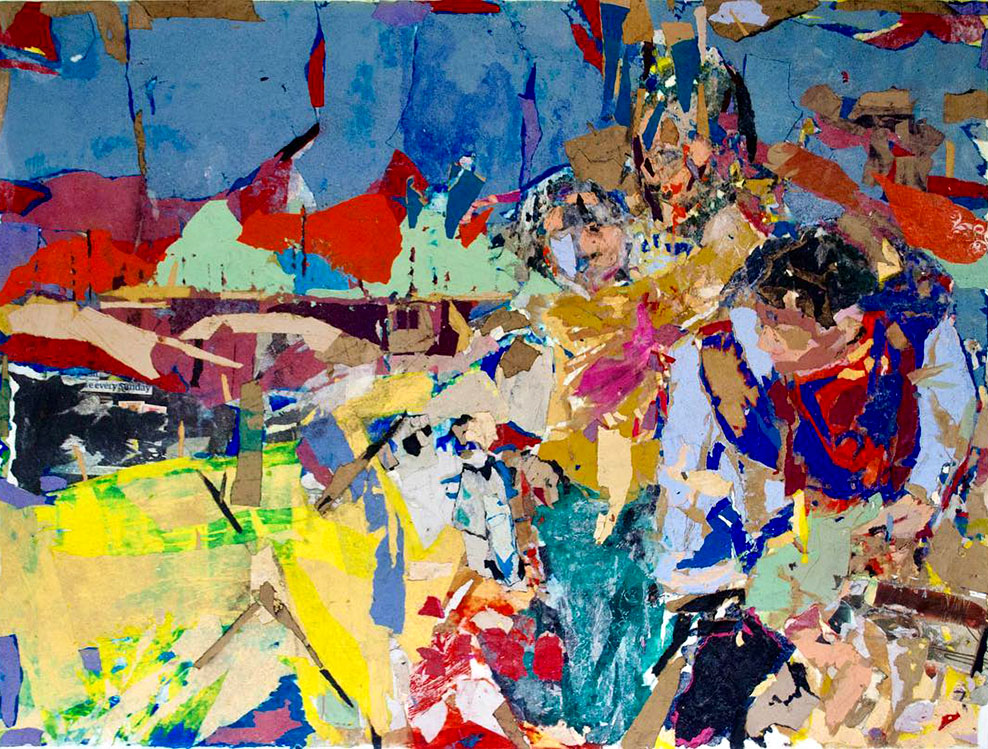
You’ve seen the image by now I’m sure. Orange life jackets piled high on a Greek shore. It’s become a cliché. Our lives have become a cliché. But clichés happen, right? Some of these life jackets belong to those that have survived like us, others are gifts from the dead.
We have reached France. We are one of the few Syrian families that made it this far. It’s not at all what I imagined. There is no United Nations here, no government presence. It’s just pure chaos. We make our tent out of tree branches and discarded plastic sheets. At night we huddle together like animals trying to keep warm. There are volunteers here who come to help. Kind people but all amateurs. One of the volunteer lawyers said she might be able to help us get asylum in the UK. We have a chance because of my husband’s brother but it’s also possible we could get turned down. We could get deported out of France to God knows where. We are so close to England. On a good day you can see it from the shore.
Two white Englishmen come to the camp. They set up a theatre. For a while they bring joy as they encourage us to act out our stories. Then one day, they pack up and leave. I learn they turned our stories into a show they took to a place in London called “The West End,” have you heard of it? And another place called “Broadway” in America. I miss those guys, they were fun, but I doubt I’ll ever see them again. I hope the money they made from our stories brought them happiness.
I’m outside our tent, trying to boil water on the wood fire. Suddenly I see him. Jamal, my Jamal. He is 100 meters away on the main road and then he disappears. I run after him. I don’t dare shout out his name. A married woman shouting the name of a man that is not her husband. It won’t do. I get to the main road and I catch a glimpse of him turning a corner into a lane. I run after him. He is nowhere. At the end of the lane there is a small mosque, a ramshackle hut with prayer mats that the men have built. The mosque is full of men so I don’t enter. I’m pacing outside like a wild animal waiting for the prayer time to be over. When the men emerge, I scrutinize every face. Nothing. Nothing. Nothing!
I get back to our tent, Younis is crying, he has soiled himself and my husband is furious. “Where the hell have you been?” I think he is about to hit me but then he just stares at me. He must be frightened by the look on my face. Do I look insane? I take the diaper from him and change Younis without saying a word.
The news is filled with fear stories about terrorists being amongst us refugees. This makes me think of Jamal again and what he said about the Jewish refugees. There were fears that amongst them were Nazi spies. All these fears turned out to exaggerated in the end. But it was too late for the people on the ship no one wanted.
This morning, I buy a new SIM that works in France. I log into Facebook and see that Jamal has posted! Just 22 minutes ago. I look in the about section of his profile. He has deleted his Syrian address. Where is he? Could he really be here in France? Or maybe he got asylum in the UK. Maybe he is in London? In Notting Hill? In the bookshop?
Tonight is going to be the first night in a long time where I look forward to falling asleep.
End Note
“The Ship No One Wanted” from Chambers of the Heart will have a staged reading at London’s Shubbak: A Window on Contemporary Arab Cultures festival on Sunday 9, July 2023.



